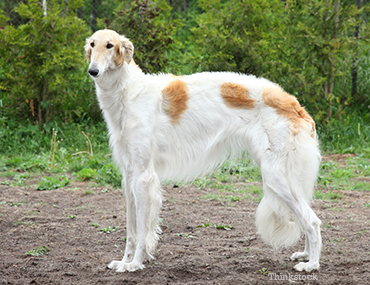Background
Borzois were developed in Russia during the 1600s and were favored by Russian aristocracy for hundreds of years. They’re the result of cross breeding between the Arabian Greyhound and thick coated Russian breeds. The first standard for Borzois was written in 1650 and has undergone very few changes in the time since then.
Hunting was taken very seriously in Russia through the 1800s. Often times hunting events involved a grand ceremony attended by the most influential of sorts. Hundreds of Borzois may have been on hand to hunt rabbit or more commonly wolf. The Borzois generally worked in teams. They could attack a wolf from two different sides and pin them to the ground until the hunter arrived to either finish the kill or set the animal free.
Borzois were rarely let out of Russia and so were nearly made extinct during the Russian revolution. During that time they were killed on mass because of their association with the aristocracy. By the 1940s there were sparse pockets of Borzoi in America, England and Russia, but they were dwindling fast. Constantin Esmont convinced the Russian government that Borzois were a vital breed and so a government regulated breeding program was started to save the Borzoi.
In America the Borzoi was officially recognized as a breed in 1891. They’re numbers have remained modest and they are often seen as a celebrity glamour dog.
 Sizing up
Sizing up
- Weight: 55 to 120 lbs.
- Height: 26 to 28 inches
- Coat: Long silky coat
- Color: Most any color
- Life expectancy: 10 to 13 years
What’s the Borzoi like?
Borzois are instinctually hunters but are actually a relatively low energy dog preferring a good sprint to a marathon. They will require at least a walk every day but are more inclined to become couch potatoes than other dogs might be. Still, they won’t hesitate to chase smaller animals, even small dogs, and hold them by the neck until you arrive to pry them off. Fences and leashes are definitely a good idea for this breed.
Around strangers Borzois might be reluctant to approach but shouldn’t ever be aggressive. They’re not going to make good guard dogs although they may alert you to a newcomer’s presence. Kids might also make Borzois nervous unless they’ve known them since birth.
Training Borzois can be challenging but their difficult reputation is overstated. With the proper motivation a Borzoi can compete in agility training and obey commands with ease. What they don’t like are repetitive tasks or harsh words.
Borzois will require frequent grooming: as much as three times per week. They can shed heavily at times.
Health
You should be on the lookout for any of the following conditions in the Borzoi:
- Gastric torsion
- Cardiomyopathy
- Cardiac arrhythmia
- Progressive retinal atrophy
- Wobbler syndrome
- Heart disease
- Hypothyroidism
- Cataracts
Takeaway Points
- Borzois are challenging but rewarding to train.
- Borzois are hunters by nature.
- Borzois don’t need as much exercise as other hunting dogs.
If you have any questions or concerns, you should always visit or call your veterinarian -- they are your best resource to ensure the health and well-being of your pets.
